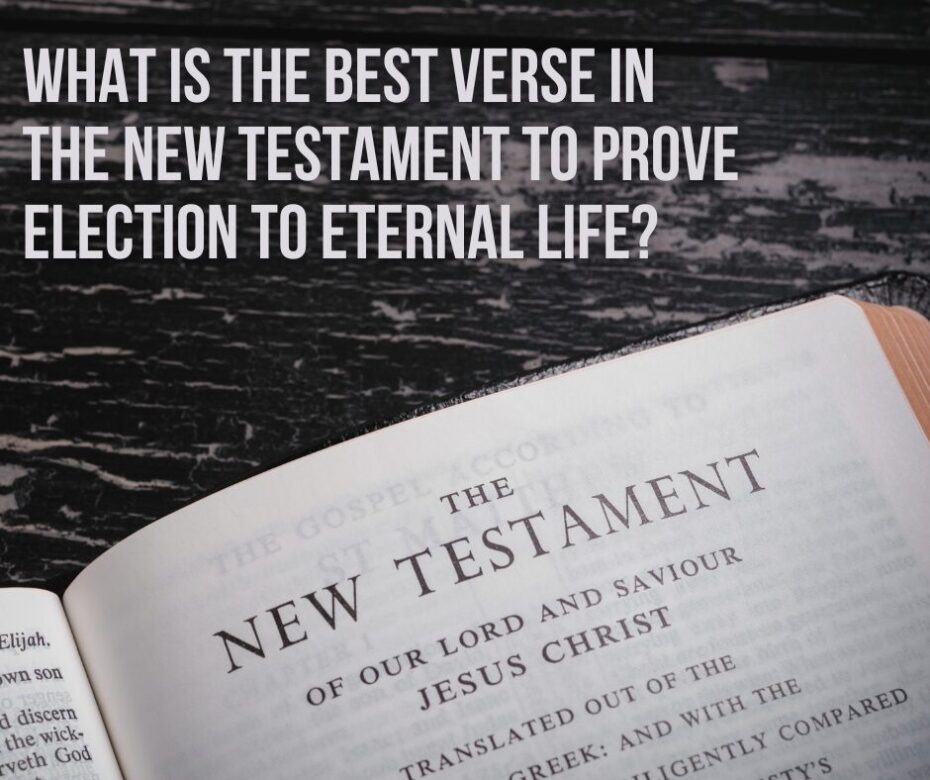According to Calvinists, the elect is one of the most important expressions in the Bible even though it occurs only seven times in the NT (Matt 24:24; Mark 13:22; Rom 11:7; Col 3:12; 1 Tim 5:21; 2 Tim 2:10; and 2 John 1). Without the definite article, the words elect or election occur another sixteen times in the NT.
However, other words convey the idea of election or selection. The words choose or chosen occur thirty-seven times in the NT.
The Greek words are eklego (I choose or I elect), eklektos (elect), ekloge (election), proorizo (I predestine), haireo (I choose), tasso (I appoint, place), and horizo (I appoint, determine).
Sam Storms, a leading Calvinist, has an online article entitled, “Biblical Terminology of Election.” See here. Those seven words occur seventy-six times in the NT.
Storm says that the majority of references to election or choosing in the NT do not concern what he calls election to eternal life. By his own count, only thirty-six of the seventy-six references refer to election to eternal life. That is slightly under half.
Today, in preparation for my Sunday School class, I evaluated all thirty-six references that Storm suggests refer to election to eternal life.
I went through them one by one.
I will give you the Cliff Notes version of my study.
Nine of his thirty-six are found in the Synoptic Gospels and refer to Israel, God’s chosen people (Matt 22:14; 24:22, 24, 31; Mark 13:20 (twice), 22, 27; Luke 18:7). Those have nothing to do with individuals or a group’s being chosen to eternal life.
Down to twenty-seven possible references.
Three of his examples are found in Acts, and one refers to Israel (Acts 13:17), one refers to Paul as God’s chosen vessel (Acts 9:15), and one does not refer to election at all (Acts 13:48).
Down to twenty-four of seventy-six.
That Calvinists cite such weak support hurts their case.
I will skip to the most decisive verses that Calvinists cite.i
There are two uses in Peter’s epistles: 1 Peter: 1:1 and 2 Pet 1:10.
The word elect actually occurs in 1 Pet 1:2, rather than before the word sojourners in verse 1. Translators, for some odd reason, moved it. Peter was writing to elect sojourners. That is, they were chosen to be dispersed from their homelands.
Second Peter 1:10 refers to being called and chosen to have a rich entrance into the kingdom (2 Pet 1:11).
Neither 1 Pet 1:2 nor 2 Pet 1:10 refers to election to eternal life.
First Thessalonians 1:4 is a vague reference: “knowing, beloved brethren, your election by God.” Election to what? In The Grace New Testament Commentary, I wrote: “Paul might simply mean that he knows that they were chosen by God to uplift the name of Jesus in the city of Thessalonica. If, however, the context is considered, it seems that Paul is speaking more specifically of their being chosen to suffer for Christ. See vv 5–10 and the discussion there” (“1 Thessalonians,” p. 931).
Fee suggests that this refers to what he calls after–the–fact corporate election that makes all who believe in Jesus part of the Church, the believing community: “It should be noted that in the present case Paul is thinking of the whole body of Thessalonian believers as elect, not individual believers…Moreover, for Paul ‘election’ is always a referent to believers, and thus reflects a reality after the fact, not before; and as here it is always seen as an action of God’s love, and thus it becomes a dynamic force in the life of the believing community” (1-2 Thessalonians, p. 31, italics added).
Probably the strongest verse of the seventy-six is 2 Thess 2:13. This is the only verse in the NT that says God chose someone “for salvation.” So maybe this lone verse proves the Calvinist view of election.
Salvation (soteria) in 1-2 Thessalonians refers to deliverance from the Tribulation, not from eternal condemnation. Compare 1 Thess 5:8-9 and 2 Thess 2:10 (see also 1 Thess 2:16). God had chosen to take believers away from the earth during the Tribulation. The issue is not individual nor is it eternal destiny. The Holy Spirit has sanctified us, set us apart, so that we will be leaving here before the Tribulation begins.
That’s it. We are down to zero out of seventy-six. Not a single verse in the NT supports election to everlasting life.
I urge you to do this study for yourself.
Of course, verses like John 5:39-40 and Acts 13:46 show that the idea of election to eternal life is invalid. However, it is encouraging to see that not one of the verses Calvinists cite refers to election to eternal life.
Keep grace in focus.
__________
i I have a discussion of election in the appendix of The Ten Most Misunderstood Words in the Bible. I’m writing a new book on the most important words in the Bible, and one of the chapters will be on election. In that chapter, I will go through all of the thirty-six verses that Storm cites as teaching election to eternal life.


